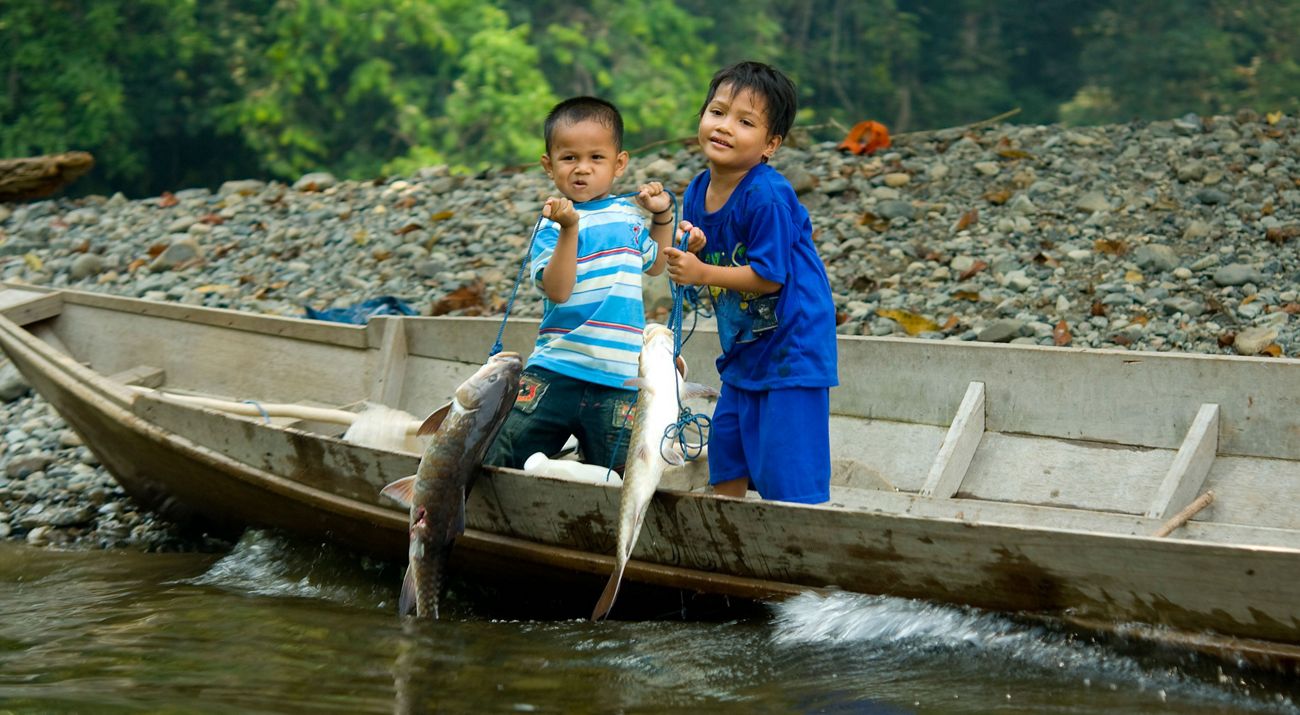Logging, mining and the rapidly growing oil palm industry are killing off the forests of Indonesia faster than anywhere else on earth. The destruction of these forests produces 80 percent of Indonesia’s carbon emissions, placing it among the world’s top emitters of climate changing greenhouse gasses, alongside the United States and China.
But Indonesia is now working to develop a unique nationwide program that will use forest conservation to directly lower its carbon emissions and combat climate change, while also protecting biodiversity and improving the livelihoods of local communities.
On Indonesia’s island of Borneo, the district of Berau—which spans 5.4 million acres, 75 percent of which is covered by forest— is working to become the first municipality under the national program to implement the new conservation strategies and measurably reduce the amount of carbon it emits into the atmosphere.
Collaborating with indigenous groups, government agencies, global businesses and international NGOs, Berau is developing plans to combine on-the-ground conservation, financial incentives, scientific monitoring and sustainable economic activities to:
- Protect and improve the management of more than 2.4 million acres of forest;
- Reduce its carbon emissions by some 3 million tons each year (that’s equivalent to removing 600 million cars from America’s highways);
- Safeguard one of the world’s largest populations of orangutans;
- Stimulate local and national economies;
- Ensure the long-term health of the region’s water and food resources that local communities rely upon for survival.
By using forest conservation to reduce carbon emissions and improve local livelihoods, Berau can demonstrate how developing countries can participate in the emerging global carbon credit market to reap financial benefits from protecting their forests, rather then destroying them.
The success of Berau’s program also may spur other tropical forest nations to do the same and increase the likelihood that the next Kyoto Protocol will provide the financial incentives needed to make forest conservation a powerful tool against climate change.
How it will work
Berau’s forests face serious threats from logging—both legal and illegal—as well as from mining operations and the spread of palm oil plantations, which have rapidly overtaken much of Indonesia’s lands as demand for biofuels and consumer products such as cosmetics and cooking oil increases around the world.
While large corporations have profited from these operations, local communities as well as Indonesia’s government do not reap the same benefits. Illegal logging costs Indonesia up to $4 billion a year in lost revenue. Local communities often have no land rights and therefore are never paid for logging that occurs in their forests. And as forests disappear, so do the vital water and food resources they provide to local communities. The forests of Berau are also home to one of the world’s largest populations of orangutans.
To stop the growing threats deforestation poses to its economy and communities—while also joining the international fight against climate change—Berau is developing plans to work with a variety of public and private partners to:
- Scientifically survey forests to identify areas most at risk, develop a baseline for measuring deforestation and create an inventory of stored forest carbon;
- Reduce forest loss by:
- Implementing efficient logging practices that reduce forest destruction and carbon emissions while also maintaining jobs and profitable wood production;
- Using “land swaps” to move the development of palm oil plantations to already degraded areas and away from healthy and undisturbed forests;
- Establishing protected areas to ensure the long-term health of critical habitat and biodiversity;
- Creating sustainable economies that promote forest conservation while providing income to local communities;
- Develop an internationally-recognized carbon monitoring and verification system to measure changes in carbon storage over time;
- Sell emissions reductions “credits” to voluntary carbon market buyers;
- Implement a payment mechanism to equitably distribute income from carbon markets to all stakeholders.
At the current rate of forest loss, action must be taken now or Indonesia’s forests—and the communities who rely upon them for survival—will soon disappear.
Studies have shown that by joining the international fight against climate change and becoming a member of the global market for carbon credits, developing countries can generate as much income through sustainable forest management as they currently do through forest destruction. With the support of international donors and governments, Indonesia will not only be able to sustainably use its natural resources to produce food, timber, pulp and oil palm, but it will be able to produce carbon credits as well.
Through the participation of internationally recognized forest carbon experts such as The Nature Conservancy, scientific monitoring and verification will ensure that the carbon benefits are real and permanent.
By implementing a broad range of conservation strategies, working on a government-wide scale and bringing together local as well as international partners, the Berau program will serve as a model of how developing countries and industrialized nations can join forces to fight climate change by preventing the destruction of the world’s forests.
Working Together to Stop Climate Change
The developing world will soon emit more greenhouse gas emissions than industrialized nations. The fight against climate change cannot be won without the full participation of these developing countries. Just as industrialized nations have been given the power under Kyoto to earn valuable carbon credits and financial incentives to curb their factory emissions, developing countries must be allowed to earn credits by reducing carbon produced by their biggest source—deforestation.
The protection of the world’s forests is not only essential to conserving biodiversity and improving the lives of local communities, it also is one of our most powerful tools in the global fight against climate change.


